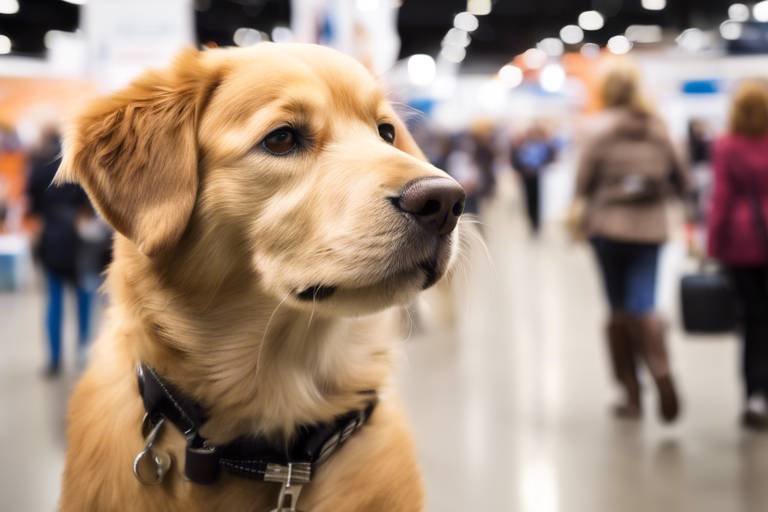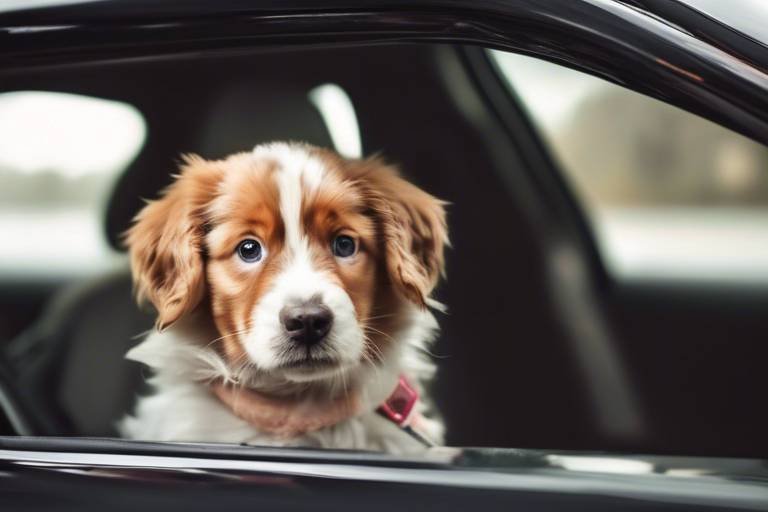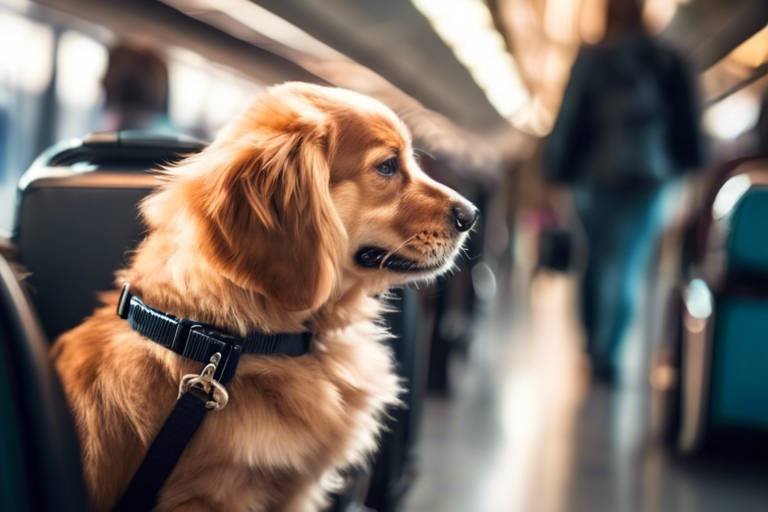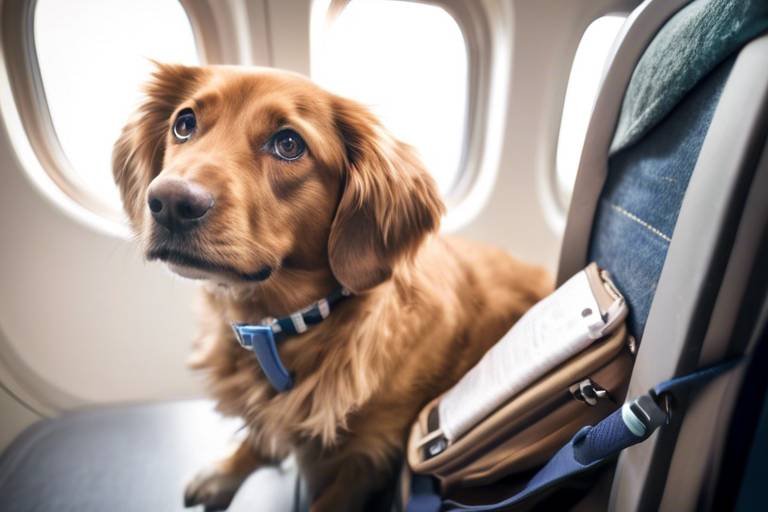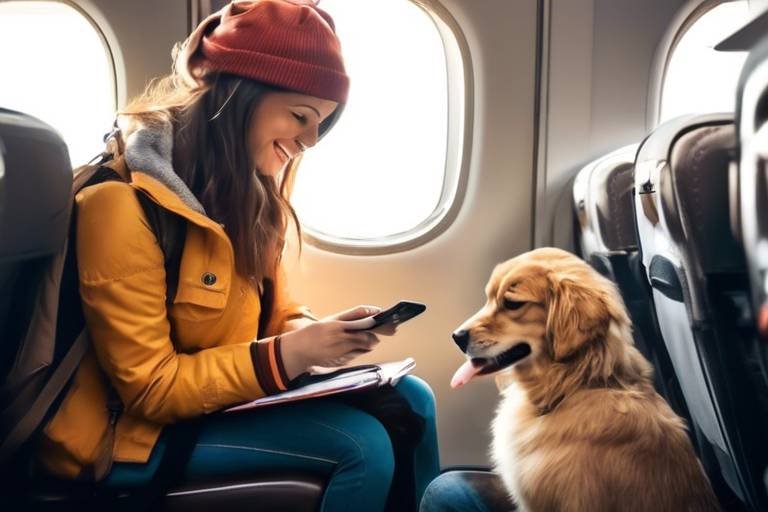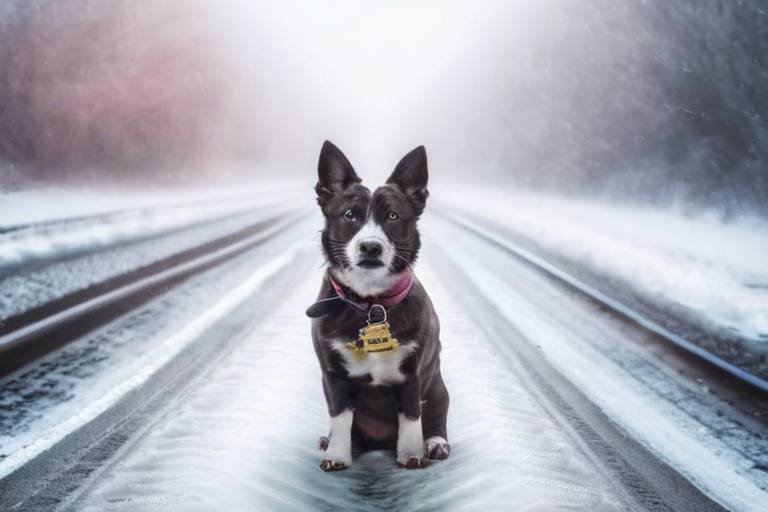Traveling with Exotic Pets - Tips and Tricks
Traveling with exotic pets can be an exhilarating adventure, but it comes with its own set of challenges. Whether you're heading to a new city or a different country, ensuring the safety and comfort of your furry, scaly, or feathery friends is paramount. After all, they rely on us to provide a secure environment, just like a child depends on their parent. So, how do you ensure a smooth journey for both you and your exotic pet? Read on for essential tips and tricks that will help you navigate the complexities of pet travel.
Selecting an appropriate carrier is crucial for your exotic pet's safety and comfort during travel. Think of the carrier as your pet's personal sanctuary on the go. It should be spacious enough for them to stand, turn around, and lie down comfortably. Additionally, consider the following factors when choosing a carrier:
- Size: Ensure the carrier is the right size for your pet. Too small can cause stress, while too large may not provide the sense of security they need.
- Ventilation: Proper airflow is essential. Look for carriers with mesh panels or ventilation holes to keep your pet cool and comfortable.
- Security Features: Choose a sturdy carrier with a secure locking mechanism to prevent escapes during travel.
By taking these elements into account, you can create a stress-free experience for both you and your pet.
Before embarking on your journey, it’s important to acclimate your exotic pet to their carrier and travel environment. Just like we might feel anxious about a new situation, your pet can feel the same way. Gradual exposure is key! Start by letting your pet explore the carrier at home. Place their favorite blanket or toy inside to make it feel more familiar. Over time, you can begin taking short trips around the block to help them adjust to the motion and sounds of travel. This preparation can significantly reduce anxiety and make the trip more enjoyable for everyone involved.
Before you hit the road or board that plane, schedule a vet check-up to ensure your exotic pet is healthy and fit for travel. It’s like getting a health certificate before a big game; you want to be sure you’re in top form! Additionally, obtain necessary health certificates and vaccination records, as these may be required for travel, especially across state or country borders. Having these documents on hand can save you from potential headaches at checkpoints or airports.
Different regions have specific regulations regarding exotic pets. Familiarize yourself with local laws and requirements to avoid fines or confiscation during your travels. It’s like knowing the rules of a game before you start playing; understanding the regulations can help you navigate smoothly. Research the regulations of your destination, including any quarantine requirements, and ensure you comply with them.
Microchipping your exotic pet can provide peace of mind. In case they get lost during travel, having proper identification increases the chances of a safe return. Think of it as a safety net; it’s always better to be prepared. Make sure to register the microchip and keep your contact information up to date, so you can be reached if your pet wanders off.
Deciding whether to travel by air or road can impact your pet's experience significantly. Each mode of transportation has its pros and cons, and it’s essential to consider your pet's needs. For instance, while traveling by road allows for more frequent breaks and the comfort of familiar surroundings, flying might be faster for long distances. Here’s a quick comparison:
| Mode of Travel | Pros | Cons |
|---|---|---|
| Air Travel | Faster, often more direct | Less control over environment, potential stress |
| Road Travel | More control, familiar environment | Longer travel time, potential for motion sickness |
Ultimately, the choice depends on your pet's temperament, the distance you’re traveling, and your personal preferences.
Maintaining your exotic pet's diet is essential while traveling. Just like you wouldn’t want to skip meals on a long trip, your pet deserves the same consideration. Plan ahead to ensure that you have the right food and hydration options available during the journey. Pack their regular food in a secure container, and bring along portable water bowls to keep them hydrated. Remember, a well-fed pet is a happy pet!
Travel can be stressful for exotic pets. Implement strategies such as familiar scents, calming music, or even medication, if necessary, to help ease their anxiety during the trip. Think of it as creating a soothing atmosphere; a little comfort can go a long way. You might also consider using pheromone sprays or natural calming supplements to help keep your pet relaxed.
After reaching your destination, monitor your exotic pet for any signs of stress or illness. Just like you might feel a bit out of sorts after a long journey, your pet may need some time to adjust. Providing a comfortable environment can help them recover from the travel experience. Set up a cozy space with their favorite items, and allow them to acclimate at their own pace. This attention to post-travel care can make all the difference in ensuring your pet feels safe and secure in their new surroundings.
- What type of carrier is best for my exotic pet? Look for a carrier that is spacious, well-ventilated, and secure.
- Do I need a health certificate for my exotic pet? Yes, a health certificate is often required, especially for air travel or crossing state lines.
- How can I reduce my pet's travel anxiety? Gradual acclimation, familiar scents, and calming music can help alleviate anxiety.
- Is microchipping necessary? While not mandatory, microchipping is highly recommended for identification purposes.

Choosing the Right Carrier
When it comes to traveling with your exotic pet, is not just a matter of convenience; it's a crucial step in ensuring your pet's safety and comfort during the journey. Imagine yourself crammed into a tiny space for hours on end—uncomfortable, right? Your pet deserves better! The carrier should be spacious enough for them to stand, turn around, and lie down comfortably. A good rule of thumb is to select a carrier that is at least one and a half times the size of your pet when they are fully stretched out.
Ventilation is another key factor. Exotic pets, like reptiles or birds, can be sensitive to heat and humidity, making proper airflow essential. Look for carriers that have mesh panels or ventilation holes to allow fresh air to circulate. This helps prevent overheating and keeps your pet calm. Additionally, security features are vital. The last thing you want is for your pet to escape during transit! Ensure that the carrier has a reliable locking mechanism and that it is sturdy enough to withstand any unexpected bumps along the way.
Let’s not forget about the material of the carrier. Soft-sided carriers are often more comfortable and easier to transport, but they may not be suitable for all types of exotic pets. For larger animals or those that might chew or scratch, a hard-sided carrier could be the better option. Here’s a quick comparison:
| Carrier Type | Pros | Cons |
|---|---|---|
| Soft-Sided |
|
|
| Hard-Sided |
|
|
Lastly, consider your pet's unique needs. Some exotic pets may require additional features, such as a water dish or a heat source, especially during long journeys. Always think ahead and customize the carrier to fit your pet’s requirements. After all, a little preparation can go a long way in making your travel experience enjoyable for both you and your furry, scaly, or feathered friend!

Preparing Your Pet for Travel
Traveling with your exotic pet can be a thrilling adventure, but it's essential to prepare both them and yourself for the journey ahead. Just like you wouldn’t jump into a road trip without a plan, your furry (or scaly) friend deserves the same consideration. Start by introducing your exotic pet to their carrier well in advance. This is not just a box; it’s their safe haven during travel. Place the carrier in a familiar space, allowing them to explore it at their own pace. You can even entice them with treats or toys to create positive associations with the carrier.
Acclimatizing your pet to the travel environment is equally important. If your pet is used to a quiet home, sudden noises from the car or airport can be overwhelming. Gradually expose them to similar sounds at home. Play recordings of traffic, airplane noises, or bustling crowds to help them adjust. This might seem like a small step, but it can significantly reduce anxiety during the actual trip.
Another vital aspect is ensuring that your exotic pet is in good health. A pre-travel vet check-up is non-negotiable. Schedule an appointment to confirm that your pet is fit for travel. During this visit, ask for health certificates and vaccination records, as these documents can be crucial, especially when crossing state or country borders. It’s like having a passport for your pet—necessary for a smooth journey!
When you're at the vet, make sure to discuss any specific concerns you might have regarding travel. Some exotic pets may require special care or medications for the journey. Your vet can provide tailored advice based on your pet's species and health status. Also, don't forget to ask for a list of emergency contacts—vets or animal hospitals at your destination—just in case something goes awry.
Before you pack your bags, familiarize yourself with the regulations regarding exotic pets in your destination area. Some regions have strict laws about which species can be brought in, and failing to comply can lead to fines or even confiscation of your pet. It's always better to be safe than sorry, so a little research goes a long way in ensuring a hassle-free experience.
Microchipping your exotic pet is another layer of security that can provide peace of mind. Imagine losing your beloved pet in a new environment; it’s a nightmare scenario. A microchip, along with a collar that has an ID tag, can significantly increase the chances of a safe return. Ensure that your contact information is up to date on the microchip registry, and consider adding a temporary travel tag with your travel details.
As you prepare for your trip, remember that the goal is to create a stress-free experience for your exotic pet. With the right preparation, you can help them feel safe and secure, transforming what could be a daunting journey into an enjoyable adventure for both of you.
- What should I do if my exotic pet is anxious during travel? - Consider using calming aids recommended by your vet, such as pheromone sprays or calming music.
- Can I travel with my exotic pet on a plane? - Yes, but check with the airline for specific regulations and requirements regarding travel with exotic pets.
- How can I keep my exotic pet hydrated during travel? - Bring a portable water dish and offer water regularly, especially during long journeys.
Health Check and Documentation
Before you even think about hitting the road or boarding a plane with your exotic pet, one of the most crucial steps is ensuring they are in tip-top health. Just like you wouldn’t want to travel with a cold, your pet deserves to feel their best too! Schedule a comprehensive vet check-up well in advance of your trip. This is not just a formality; it’s an opportunity for your veterinarian to assess your pet’s health, provide necessary vaccinations, and address any specific concerns you might have.
During this visit, ask your vet about any health certificates or documentation that might be required for your travels. Different regions have varying regulations concerning exotic pets, and having the right paperwork can save you from potential headaches at borders or checkpoints. Here’s a quick rundown of essential documents you might need:
- Health Certificate: Proof that your pet is healthy and fit for travel.
- Vaccination Records: Documentation showing your pet is up-to-date on required vaccinations.
- Import Permits: Depending on your destination, you may need special permits to bring your pet.
Additionally, it’s wise to keep a copy of these documents on hand during your travels. You never know when you might need to show them, especially if you’re crossing state lines or heading to a different country. Having these documents easily accessible can make a world of difference and keep your journey smooth.
Lastly, consider microchipping your exotic pet. This small procedure can be a lifesaver in case your pet gets lost during your travels. A microchip provides a permanent form of identification that can be scanned by veterinarians or animal shelters, greatly increasing the chances of reuniting with your furry friend.
By prioritizing your pet's health and ensuring you have all necessary documentation, you set the stage for a safe and enjoyable travel experience for both you and your exotic companion!
Q: Do I really need a health certificate for my exotic pet?
A: Yes, many regions require a health certificate to ensure your pet is healthy and free from diseases. It’s best to check the specific requirements for your destination.
Q: How can I prepare my pet for the vet visit?
A: Make the experience as stress-free as possible by bringing along familiar items such as their favorite toy or blanket. You can also practice handling them gently to make them comfortable.
Q: What if my pet gets lost during travel?
A: Microchipping is highly recommended. It provides a permanent ID that can help reunite you with your pet if they wander off.
Q: Are there specific vaccinations required for exotic pets?
A: Yes, the required vaccinations can vary based on the type of exotic pet and your travel destination. Always consult your veterinarian for the most accurate information.
Understanding Travel Regulations
When it comes to traveling with your exotic pet, understanding the travel regulations is crucial. Different regions have specific laws that govern the transportation of exotic animals, and failing to comply can lead to serious consequences, including fines or even confiscation of your beloved pet. Before you hit the road or board a flight, take the time to research the regulations of your destination. This not only ensures a smoother journey but also protects your pet's well-being.
In many cases, you may need to provide certain documentation, such as health certificates and proof of vaccinations. These documents serve as a passport for your pet, validating that they are healthy and free from diseases. To help you navigate this complex landscape, consider the following:
- Destination Regulations: Each state or country may have unique requirements regarding the types of exotic pets allowed and the necessary paperwork.
- Import and Export Laws: If you are crossing international borders, familiarize yourself with both the export laws of your home country and the import laws of your destination.
- Quarantine Requirements: Some regions may require a quarantine period for exotic pets upon arrival. Make sure to plan accordingly.
Additionally, it's wise to check with your airline or travel company about their specific policies regarding exotic animals. Some airlines have restrictions on the types of pets that can travel in the cabin or as cargo, and understanding these rules can save you from last-minute surprises at the airport.
Lastly, don't forget to consider the local wildlife laws at your destination. In some areas, certain exotic pets may be prohibited due to environmental concerns. Ignorance of these laws is not an excuse, so take the time to educate yourself. By being proactive and informed, you can ensure a safe and enjoyable journey for both you and your exotic companion.
- What documents do I need to travel with my exotic pet? You typically need a health certificate, vaccination records, and possibly an import permit depending on your destination.
- Can I take my exotic pet on a plane? Yes, but you must check with the airline for their specific policies regarding exotic pets.
- What should I do if my pet gets lost during travel? Ensure your pet is microchipped and has proper identification tags to increase the chances of a safe return.
Microchipping and Identification
When it comes to traveling with your exotic pets, ensuring their safety is paramount, and one of the best ways to do this is through microchipping. Microchipping is a simple and effective procedure that involves inserting a tiny chip, about the size of a grain of rice, under your pet's skin. This chip contains a unique identification number that can be scanned by veterinarians or animal shelters, providing a reliable way to identify your pet if they get lost during your travels.
Imagine this scenario: You're exploring a beautiful new location, and your exotic pet slips out of its carrier during a brief stop. Panic sets in, and you frantically search for them, but without proper identification, the chances of being reunited diminish. This is where microchipping shines. It acts as a safety net, ensuring that if your beloved pet is found, they can be returned to you quickly and safely.
In addition to microchipping, it's essential to have visible identification on your pet. Consider using a sturdy collar with an attached ID tag that includes your contact information. This way, even if someone finds your pet and the chip isn't scanned immediately, they can still reach out to you directly. Here are some key points to remember about microchipping and identification:
- Permanent Solution: Unlike collars that can fall off, microchips are a permanent form of identification.
- Quick and Painless: The microchipping process is quick and generally painless for your pet.
- Update Your Information: Always ensure that your contact information is up to date in the microchip registry.
Before you embark on your journey, consult your veterinarian about microchipping. They can provide guidance on the best practices and ensure your pet is chipped correctly. Remember, while microchipping significantly increases the chances of a safe reunion, it should be part of a comprehensive identification strategy that includes visible tags and, if possible, a travel-friendly harness.
In conclusion, microchipping your exotic pet is a small step that can lead to a big difference in ensuring their safety during travel. It’s a proactive measure that gives you peace of mind, allowing you to focus on enjoying your adventure together. So, don’t leave home without it!
Here are some common questions regarding microchipping and identification for exotic pets:
| Question | Answer |
|---|---|
| Is microchipping safe for my exotic pet? | Yes, microchipping is a safe, quick, and minimally invasive procedure that can be done by a veterinarian. |
| How much does microchipping cost? | The cost can vary, but it typically ranges from $30 to $60, including registration. |
| Can I track my pet with a microchip? | No, microchips do not have GPS capabilities; they are used for identification purposes only. |
| What should I do if my pet gets lost? | Immediately contact local shelters and veterinary clinics, and provide them with your pet's microchip information. |
Traveling by Air vs. Road
When it comes to traveling with your exotic pet, the choice between air travel and road trips can significantly impact their experience. Each mode of transportation presents its own unique set of challenges and advantages that you should carefully consider. For instance, air travel can be quicker, allowing you to reach your destination in a matter of hours, which is great if you're headed to a far-off location. However, the hustle and bustle of airports, along with the potential for extreme temperatures in cargo holds, can be stressful for your furry or scaly companion.
On the other hand, road trips offer a more relaxed environment where you can control the temperature, stops, and overall pace of the journey. Imagine cruising down the highway with your exotic pet comfortably nestled in their carrier, stopping at pet-friendly rest areas to stretch and hydrate. This can be a more enjoyable experience for both of you, but it also means longer travel times and the need for more extensive planning.
Here’s a quick comparison to help you weigh your options:
| Factor | Air Travel | Road Travel |
|---|---|---|
| Duration | Fast, especially for long distances | Slower, but flexible |
| Comfort | Potentially stressful; confined space | More space and control over environment |
| Cost | Can be expensive (tickets, fees) | Gas and accommodation costs |
| Regulations | Strict airline regulations | More lenient but still requires planning |
| Health Risks | Exposure to extreme temperatures | Long periods in the car can be tiring |
Ultimately, the best choice depends on your pet’s specific needs and temperament. For example, if your pet is particularly anxious, a road trip might be the way to go, allowing for frequent breaks and a more familiar environment. Conversely, if you’re traveling a long distance and your pet is accustomed to being in a carrier, air travel could save you a lot of time.
Before making your decision, consider your pet's personality. Are they adventurous and adaptable, or do they prefer the comfort of home? Understanding their behavior can help you choose the best option for a smooth journey.
- Can I take my exotic pet on a plane? - Yes, but you must check with the airline for their specific regulations regarding exotic pets.
- What should I pack for my exotic pet? - Bring food, water, a familiar blanket, and any necessary medications.
- How can I keep my pet calm during travel? - Use familiar scents, calming music, or consult your vet for possible medication options.
- Are there specific health checks required before traveling? - Yes, a vet check-up is essential, along with obtaining health certificates.

Feeding and Hydration Tips
When it comes to traveling with your exotic pet, maintaining their diet and hydration is absolutely essential. Just like us, our furry or scaly friends need to eat and drink regularly, even when they’re on the go. Imagine trying to enjoy a road trip on an empty stomach—your pet feels the same way! So, planning ahead is key.
First and foremost, you need to know your pet's dietary needs. Different exotic pets have unique requirements. For instance, a bearded dragon might need a mix of greens and insects, while a parrot may thrive on seeds, fruits, and vegetables. Make a list of their favorite foods and ensure you pack enough for the duration of your trip. It’s also wise to stick to their usual diet to avoid any digestive surprises during travel.
When packing food, consider using airtight containers to keep their meals fresh. If you’re traveling by air, check the airline’s regulations regarding pet food, as some may have restrictions on certain items. Additionally, if your pet is on a special diet, bringing their food ensures they won’t have to face any sudden changes that could upset their stomach.
Now, let’s talk about hydration. Keeping your pet hydrated is crucial, especially during long trips. Always have a portable water bottle or a travel bowl handy. For those long drives, you might want to consider a spill-proof water container to minimize mess while ensuring your pet has access to fresh water at all times. Remember, just like you wouldn't want to be parched on a road trip, your pet deserves the same comfort!
During travel, offer water at regular intervals, but be mindful of how much you give them, especially if you’re on a plane. Too much water can lead to discomfort, so find a balance. If your pet is a little hesitant to drink, try adding a few ice cubes to their water bowl; many pets find it enticing and refreshing.
Lastly, if your journey is particularly long, consider scheduling breaks to allow your pet to stretch their legs and have a nibble. This not only helps them physically but also gives them a chance to relieve themselves. It’s a win-win situation! Just remember to keep a close eye on them in unfamiliar areas, as exotic pets can be more vulnerable than typical household pets.
| Pet Type | Food Recommendations | Hydration Tips |
|---|---|---|
| Bearded Dragon | Greens, Crickets, Mealworms | Portable water bowl, Ice cubes |
| Parrot | Seeds, Fruits, Vegetables | Travel water bottle, Frequent breaks |
| Ferret | High-protein kibble, Treats | Water bottle with sipper, Avoid overhydration |
In conclusion, ensuring that your exotic pet is well-fed and hydrated during travel is not just a matter of convenience; it’s a vital component of their overall well-being. By planning ahead, sticking to their usual diet, and providing ample hydration, you can transform a potentially stressful journey into a smooth adventure for both you and your beloved pet!
Q: How often should I feed my exotic pet during travel?
A: It depends on your pet's normal feeding schedule, but generally, try to stick to their routine as closely as possible. Offering small meals during breaks can help maintain their energy levels.
Q: What if my pet refuses to eat while traveling?
A: It's not uncommon for pets to lose their appetite when stressed. Offer their favorite treats or try feeding them in a quiet, familiar environment. If the issue persists, consult your veterinarian.
Q: Can I use regular water bottles for my exotic pet?
A: While some pets may drink from regular water bottles, it’s often best to use a spill-proof or specialized pet water bottle to ensure they stay hydrated without making a mess.
Q: Are there any foods I should avoid giving my exotic pet while traveling?
A: Yes, avoid any sudden changes in diet or foods that are not part of their regular meals. Additionally, steer clear of toxic foods specific to your pet type.
Managing Stress and Anxiety
Traveling can be an exhilarating experience, but it can also be a source of stress and anxiety for our exotic pets. Just like us, they can feel overwhelmed by new environments, sounds, and smells. It’s essential to recognize the signs of stress in your pet, which may include excessive vocalization, hiding, or changes in eating habits. To help your furry or scaly friend cope, consider implementing some effective strategies.
One of the best ways to manage your pet's stress is by creating a familiar environment. Bringing along their favorite blanket, toy, or even a piece of your clothing can provide comfort and reassurance. These familiar scents can act as a soothing balm, helping to ease anxiety. Additionally, consider playing calming music during the trip. There are even playlists specifically designed for pets, filled with soft, soothing sounds that can help them relax.
If your pet is particularly anxious, you might want to consult with your veterinarian about the possibility of using medication. Some pets may benefit from anti-anxiety medications or natural supplements that can help them feel more at ease during travel. However, it’s crucial to discuss this option with a professional to determine what’s best for your pet’s unique needs.
In addition to these strategies, it’s important to maintain a regular feeding and hydration schedule. Keep their meals consistent with what they are used to, and ensure they have access to fresh water throughout the journey. Changes in diet can lead to gastrointestinal upset, which can add to their stress. If you're traveling by car, consider making frequent stops to allow your pet to stretch their legs and relieve themselves. This not only gives them a break but also helps to break up the monotony of the journey.
Finally, monitor your pet closely during the trip. Look for any signs of distress, and be ready to provide extra comfort if needed. If your pet seems particularly anxious, take a moment to reassure them with gentle words or a soft touch. Just like a parent comforting a child, your presence can make a world of difference in helping them feel secure.
Q: What are the signs of anxiety in exotic pets?
A: Signs can include excessive vocalization, hiding, changes in appetite, or unusual behaviors such as pacing or aggression.
Q: Can I use calming products for my pet?
A: Yes, there are various calming products available, including sprays, diffusers, and supplements. Always consult your vet before trying new products.
Q: Is it safe to travel with my exotic pet?
A: Yes, with proper preparation and care, traveling with exotic pets can be safe and enjoyable for both you and your pet.
Q: How can I help my pet adjust after travel?
A: Provide a comfortable and familiar environment upon arrival, and give your pet time to acclimate. Monitor their behavior for any signs of stress or health issues.
Post-Travel Care for Your Pet
After a long journey, whether by air or road, your exotic pet will need some extra love and care to help them transition into their new environment. Just like humans, pets can experience stress and fatigue after travel. Therefore, it’s essential to create a comfortable and safe space for them to unwind. Start by setting up a cozy area in your home where they can relax, away from the hustle and bustle. This can be a quiet room with their favorite blanket or bed, ensuring they feel secure and at ease.
It's also crucial to monitor your pet closely for any signs of distress or illness. Look out for symptoms such as lethargy, changes in appetite, or unusual behavior. If you notice anything concerning, don’t hesitate to reach out to your veterinarian. In fact, a check-up shortly after travel can be a good idea to ensure everything is alright. This is especially important for exotic pets, as they can be more sensitive to changes in their environment.
Additionally, reintroducing your pet to their regular routine can help them adjust more quickly. This includes feeding them at their usual times and engaging in familiar activities, such as playtime or walks. You might also consider using some of their favorite toys or blankets from home to create a sense of familiarity. This can be particularly comforting for pets that are more anxious by nature.
Moreover, maintaining hydration is vital after travel. Ensure your pet has access to fresh water at all times. If your pet is a bit hesitant to drink, try offering ice cubes or even wet food to encourage hydration. Remember, a well-hydrated pet is a happy pet!
Lastly, don’t forget to shower your pet with plenty of affection. Spend quality time with them, as your presence can be incredibly reassuring. With a little patience and care, your exotic pet will be back to their usual self in no time, ready to explore their new surroundings with joy.
- What should I do if my pet shows signs of stress after travel?
If your pet shows signs of stress, try to provide a quiet space for them to relax. Familiar scents, calming music, and gentle petting can help alleviate anxiety. If symptoms persist, consult your veterinarian. - How can I tell if my exotic pet is adjusting well after travel?
Look for signs of normal behavior such as eating, drinking, playing, and exploring their new environment. If they seem lethargic or refuse food, it might be time for a vet check-up. - Is it normal for my pet to be less active after a long trip?
Yes, it’s common for pets to be tired after travel. Allow them some time to rest and recover, but keep an eye on their activity levels and consult a vet if you notice anything unusual.
Frequently Asked Questions
- What type of carrier is best for my exotic pet?
Choosing the right carrier is essential for your exotic pet's comfort and safety. Look for a carrier that is appropriately sized, well-ventilated, and secure. It should allow your pet to stand, turn around, and lie down comfortably. Additionally, carriers with locking mechanisms can help prevent accidental escapes.
- How can I prepare my exotic pet for travel?
To prepare your pet for travel, start by gradually introducing them to their carrier. Allow them to explore it at home, adding familiar items like blankets or toys. This will help reduce anxiety and make them feel more secure during the journey. It's also a good idea to take them on short car rides to acclimate them to travel.
- Do I need a health certificate for my exotic pet?
Yes, a health certificate is often required, especially if you are traveling across state or country borders. Schedule a vet check-up before your trip to ensure your pet is healthy and obtain the necessary documentation, including vaccination records. This will help avoid any issues during your travels.
- What travel regulations should I be aware of?
Travel regulations can vary greatly depending on your destination. It's crucial to research the specific laws regarding exotic pets in the areas you’ll be visiting. This includes understanding any permits, quarantine requirements, or restrictions on certain species to prevent fines or confiscation.
- Is microchipping necessary for my exotic pet?
Microchipping your exotic pet is highly recommended. It provides a permanent form of identification that can be invaluable if your pet gets lost during travel. Make sure your contact information is up to date in the microchip registry to increase the chances of a safe return.
- Should I travel by air or road with my exotic pet?
The choice between air and road travel depends on your pet’s needs and the distance of your journey. Road travel may be less stressful for some pets, allowing for breaks and familiar surroundings. However, if you're traveling long distances, air travel might be quicker. Consider your pet's temperament and health when making this decision.
- How do I ensure my exotic pet stays hydrated during travel?
Keeping your exotic pet hydrated is crucial while traveling. Pack enough of their regular food and water, and consider bringing a portable water bowl. Offer them water during breaks, and monitor their intake to ensure they stay well-hydrated throughout your journey.
- What can I do to reduce my pet's stress during travel?
To manage your pet's stress, create a calming environment. Bring along familiar scents, such as a blanket or toy, and consider playing soothing music. If your pet has severe anxiety, consult your vet about the possibility of using calming medications to help them relax during the trip.
- What should I do after arriving at my destination?
Once you arrive, give your exotic pet time to adjust to their new surroundings. Monitor them for any signs of stress or illness, and provide a comfortable space where they can relax. Gradually introduce them to their new environment, ensuring they feel safe and secure.






